 Following the outbreak of war in 1917, President Woodrow Wilson urged Americans to observe “Meatless Mondays” and “Wheatless Wednesdays” to help the war effort. He assured families that conserving food at home would help support our troops and allies overseas and feed starving people in Europe where food production and distribution had been disrupted by war.
Following the outbreak of war in 1917, President Woodrow Wilson urged Americans to observe “Meatless Mondays” and “Wheatless Wednesdays” to help the war effort. He assured families that conserving food at home would help support our troops and allies overseas and feed starving people in Europe where food production and distribution had been disrupted by war. In 1918, Houston Goudiss, a food expert, and his wife Alberta, Director of the School of Modern Cookery, published a book entitled, Foods That Will Win The War and How to Cook Them. In it, they explained the importance of food conservation and described how seemingly small sacrifices could have a huge impact in the aggregate:
Food will win the war, and the nation whose food resources are best conserved will be the victor...A little bit of saving in food means a tremendous aggregate total, when 100,000,000 people are doing the saving. One wheatless meal a day would not mean hardship; there are always corn and other products to be used.
Yet one wheatless meal a day in every family would mean a saving of 90,000,000 bushels of wheat, which totals 5,400,000,000 lbs. Two meatless days a week would mean a saving of 2,200,000 lbs. of meat per annum. One teaspoonful of sugar per person saved each day would insure a supply ample to take care of our soldiers and our Allies.
These quantities mean but a small individual sacrifice, but when multiplied by our vast population they will immeasurably aid and encourage the men who are giving their lives to the noble cause of humanity on which our nation has embarked.
Fueled by the anti-German sentiment that spread across the nation during the Great War, certain foods were renamed to remove their ethnic connotations. Patriotic Americans proudly called sauerkraut "Liberty Cabbage," for example, while frankfurters became known as Liberty Sausage! Although the Goudiss' didn’t provide a recipe for Liberty Cabbage in their book, you can whip up this delicious recipe for Sweet and Sour Cabbage from epicurious.com
5 tablespoons butter
2 onions, thinly sliced (about 4 cups)
2/3 cup red wine vinegar
1/2 cup applesauce
2 tablespoons sugar
2 teaspoons salt
1 teaspoon ground black pepper
1/8 teaspoon ground cloves
2 pounds red cabbage, cut into 1/2-inch-wide strips
1 large Golden Delicious apple, peeled, cored, cut into thin slices
1/2 cup apple juice
Melt butter in heavy large pot over medium-low heat. Add onions; sauté until translucent, about 10 minutes. Mix in next 7 ingredients. Add cabbage; cook until cabbage begins to wilt, stirring often, about 5 minutes. Cover; simmer until cabbage is crisp-tender, stirring often, about 17 minutes. Uncover; add apple and apple juice and cook until apple is crisp-tender, about 5 minutes.
FOOD FACT: In a chapter titled "WHEAT: Reasons Why Our Government Asks Us to Save Wheat," the Goudiss' wrote: A slice of bread seems an unimportant thing. Yet one good-sized slice of bread weighs an ounce. It contains almost three-fourths of an ounce of flour. If every one of the country's 20,000,000 homes wastes on the average only one such slice of bread a day, the country is throwing away daily over 14,000,000 ounces of flour — over 875,000 pounds, or enough flour for over a million one-pound loaves a day. For a full year at this rate there would be a waste of over 319,000,000 pounds of flour — 1,500,000 barrels — enough flour to make 365,000,000 loaves.
